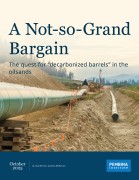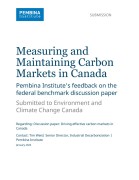New incentives under the U.S. Inflation Reduction Act for carbon capture, utilization, and storage (CCUS) technology are generating concerns about competitiveness for investment in the technology in Canada’s oil sector. Specifically, there is a growing narrative that Canadian policies and incentives for CCUS technologies pale in comparison to those offered in the United States. However, comparisons often leave out important Canadian policies and operational differences that mean CCUS matters less to decarbonizing U.S. upstream oil production. As such, direct one-to-one policy comparisons are less useful than assessing the effectiveness of the entire suite of financial supports that incentivize investment in CCUS in the specific context of Canada’s upstream oil sector.
Comparisons tend to focus on tax measures, such as Canada’s proposed CCUS Investment Tax Credit, and the recently expanded 45Q tax credit in the Inflation Reduction Act which will provide significantly more support to CCUS: about C$115/tonne. But in Alberta, where the vast majority of announced CCUS projects in Canada are located, credits from the Technology Innovation and Emissions Reduction (TIER) regulation system, combined with the announced federal Investment Tax Credit and Clean Fuel Regulations credits, will exceed the 45Q credit in 2030 with a value of at least C$135/tonne.
Important contextual differences also mean that CCUS projects in Canadian and U.S. upstream oil sectors will rarely compete for funding. Due to differences in resource profiles and emissions sources in Canadian and American oil production, methane abatement is a larger and more cost competitive emissions reduction opportunity than CCUS in the United States. Also, individual U.S. oil production emissions sources are many and dispersed, so do not lend themselves well to CCUS technology.
Ultimately, a one-to-one comparison of CCUS tax credits alone does not capture the very significant incentives for these projects through Canada’s carbon pricing policies. And, given that CCUS will not be a priority for upstream producers in the United States the way it is in Canada, the focus should be on whether the right suite of high-quality policy supports exists for CCUS in specific contexts, rather than on matching policies with the United States. Ultimately, a mix of incentives and policy can ensure that Canada’s oil sands, with their high emissions intensity, begin to reduce those emissions.










